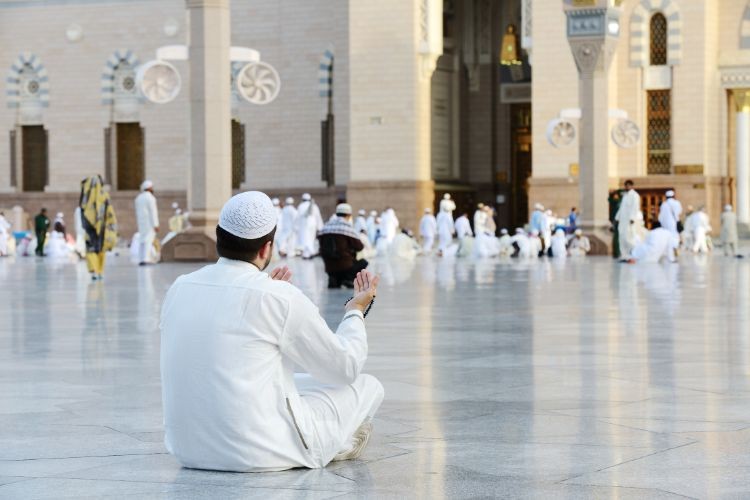The 7th century witnessed a dramatic shift in the geopolitical and cultural landscape of the Middle East and beyond with the astonishingly rapid spread of Islam. Originating from the Arabian Peninsula, this new faith swiftly garnered followers across North Africa, the Iberian Peninsula, and parts of Asia. Understanding Why Did Islam Spread So Quickly is crucial to grasping the religion’s profound and lasting impact on world history. This article delves into the multifaceted reasons behind this remarkable expansion, exploring the key factors that contributed to Islam’s swift dissemination and enduring influence.
Factors Contributing to Islam’s Rapid Expansion
To understand why did Islam spread so quickly, we must consider a range of interconnected factors, from the compelling nature of its teachings to the socio-political conditions of the time. Islam’s expansion was not solely due to one element but rather a combination of religious appeal, effective communication, ethical principles, and historical circumstances.
The Power of Wisdom and Persuasion in Early Islam
The Prophet Muhammad (peace be upon him) initiated the spread of Islam in Mecca through wisdom (hikmah) and good counsel. His early approach centered on peaceful preaching, acts of kindness, and reasoned dialogue. Despite facing persecution in Mecca, the Prophet and his followers demonstrated resilience and patience, eventually migrating to Medina.
In Medina, the Prophet skillfully navigated a diverse community, including allies, opponents, and the nascent Muslim community. He established treaties, resolved disputes peacefully, and only resorted to conflict when facing aggression or breaches of agreements. This emphasis on wisdom and peaceful propagation, even amidst opposition, was fundamental to Islam’s initial appeal.
The Quran itself emphasizes the importance of wise and gentle preaching:
“Invite to the way of your Lord with wisdom and good instruction, and argue with them in a way that is best. Indeed, your Lord is most knowing of who has strayed from His way, and He is most knowing of who is [rightly] guided.” (Quran 16:125)
This divine mandate guided the Prophet and his companions, highlighting that persuasion and understanding were paramount in spreading the Islamic message.
Ethical Conduct and the Allure of Islamic Morality
Beyond formal preaching, the ethical conduct of early Muslims played a significant role in Islam’s rapid spread. As Muslim traders ventured across Arabia and beyond, their honesty, integrity, and fair dealings impressed those they encountered. Islamic ethics, emphasizing justice, compassion, and trustworthiness, stood in stark contrast to some prevalent societal norms of the time.
When people observed the high moral standards of Muslim merchants, they were naturally curious about the source of these values. Upon learning that Islam inspired such conduct, many were drawn to investigate the faith further. This “silent preaching” through exemplary behavior was a powerful tool in attracting converts. Individuals inviting others to Islam were expected to embody these virtues, making their lives a testament to the faith’s positive impact.
Comprehensive and Just Teachings Addressing Human Needs
Islam offered a comprehensive system of beliefs and laws that addressed all aspects of human life, providing solutions and guidance that resonated deeply with many. The teachings of the Quran and the Prophet’s traditions covered spiritual, social, economic, and political dimensions, offering a holistic worldview.
Crucially, Islam promoted social justice and equality, challenging existing class structures and hierarchies. The Islamic emphasis on the equality of all people before God, regardless of race or social status, was particularly appealing in societies marked by deep social divisions. Meritocracy, based on piety and good deeds, rather than lineage or wealth, was a core Islamic principle that attracted those seeking a more just and equitable social order. This resonated in regions where existing systems were perceived as oppressive or unfair.
Religious Tolerance and the Absence of Compulsion
A cornerstone of Islamic teaching is the principle of “no compulsion in religion,” clearly stated in the Quran:
“There shall be no compulsion in [acceptance of] the religion. The right course has become clear from the wrong. So whoever disbelieves in Taghut and believes in Allah has grasped the most trustworthy handhold with no break in it. And Allah is Hearing and Knowing.” (Quran 2:256)
This verse underscores that conversion to Islam should be a matter of free will, not coercion. While Islamic empires expanded through military conquests, the imposition of faith was not the primary objective. Non-Muslims, often referred to as “People of the Book” (Christians and Jews), were generally allowed to practice their religions under Islamic rule, often with legal protections and autonomy in their community affairs in exchange for a tax (jizya). This tolerance, compared to the religious conflicts and forced conversions prevalent in other empires of the time, contributed to the stability and appeal of early Islamic societies.
Alignment with Human Nature (‘Fitrah’)
Islam presents itself as the “religion of fitrah,” meaning it aligns with the innate human disposition and natural inclinations. It acknowledges and caters to both the spiritual and material needs of individuals, promoting a balanced way of life. This concept of fitrah suggests that Islam’s teachings resonate with a fundamental human yearning for purpose, meaning, and connection with the Divine.
By addressing fundamental questions about human existence, purpose, and morality in a clear and accessible manner, Islam provided a framework for living that many found inherently satisfying and fulfilling. This sense of inner harmony and alignment with one’s natural inclinations contributed to the personal appeal of Islam and its spread.
Factors After the Prophet Muhammad’s Death
The rapid spread of Islam continued and even accelerated after the death of Prophet Muhammad. Several factors sustained and propelled this expansion in the decades and centuries that followed.
Military Conquests and Geopolitical Shifts
Military campaigns, often termed “futuhat” (openings), played a significant role in the expansion of Islamic rule and influence. The early Islamic conquests occurred in a context of weakened Byzantine and Persian Empires, which had been engaged in prolonged and exhausting wars. The Muslim armies, motivated by faith and strategic objectives, achieved decisive victories in key regions like Syria, Egypt, Persia, and North Africa.
These conquests led to the establishment of vast Islamic empires, providing a political and social framework for the further dissemination of Islam. While conquest was a factor, it is crucial to remember that conversion was not typically forced, and many regions gradually adopted Islam over time.
Trade Networks as Channels for Islamic Expansion
Trade was a vital conduit for the spread of Islam. Muslim merchants were active participants in trade routes across the Middle East, North Africa, and into Asia. These trade networks facilitated not only the exchange of goods but also the transmission of ideas and beliefs.
Islamic commercial law, known for its fairness and clarity, fostered trust and facilitated trade relationships. As Muslim traders established communities in various trading centers, they introduced Islam to new populations through their interactions, ethical business practices, and sometimes through direct missionary efforts. The trans-Saharan trade routes, maritime routes in the Indian Ocean, and the Silk Road all served as pathways for Islamic expansion through trade.
Migration and Missionary Activities (‘Dawah’)
Migration of Muslims to new lands and organized missionary efforts (dawah) further contributed to Islam’s spread. As Islamic societies grew and prospered, individuals migrated for various reasons, including trade, scholarship, and seeking new opportunities. These migrations often led to the establishment of Muslim communities in new regions, which in turn became centers for spreading Islamic teachings.
Missionary activities, dawah, involved inviting people to Islam through peaceful means, education, and community building. Scholars, Sufi mystics, and dedicated preachers played a key role in introducing Islam to diverse populations, often adapting their approaches to local cultures and contexts. The establishment of Islamic institutions like mosques, schools, and Sufi lodges in new areas facilitated the dissemination of Islamic knowledge and practices.
Conclusion
In conclusion, why did Islam spread so quickly is a question with multifaceted answers. It was not solely due to military force, but rather a complex interplay of factors. The inherent appeal of its teachings, emphasizing wisdom, ethical conduct, social justice, and a comprehensive way of life, resonated deeply with many. The religious tolerance practiced by early Islamic societies and the absence of forced conversion created an environment conducive to gradual adoption of the faith. Furthermore, military conquests, trade networks, migration, and missionary activities acted as crucial mechanisms for disseminating Islam across vast geographical regions.
Understanding the rapid spread of Islam offers valuable insights into the dynamics of religious and cultural diffusion, highlighting the power of ideas, ethics, and historical circumstances in shaping the course of human civilization.
To further your understanding of Islamic teachings and history, Madrasat El-Quran offers comprehensive online courses in Quranic studies and Islamic learning, providing personalized guidance to deepen your knowledge.
Contact Us Today to Learn More!
FAQs About the Rapid Spread of Islam
How Did Islam Expand So Rapidly After the Prophet’s Era?
Following the Prophet Muhammad’s death, Islam’s rapid expansion was propelled by a combination of military campaigns that extended Islamic rule, flourishing trade networks that disseminated Islamic beliefs and culture, and active missionary efforts (dawah) alongside Muslim migrations that established Islamic communities in new territories.
What Role Did Trade Play in the Spread of Islam?
Trade played a crucial role in the peaceful spread of Islam. Muslim traders, known for their ethical business practices and trustworthiness, established trade routes across continents. These routes became channels for cultural exchange and the introduction of Islamic principles and values to diverse populations, leading to conversions through positive interactions and influence.
Was Military Force the Primary Reason for Islam’s Spread?
While military conquests were a factor in the expansion of Islamic empires, they were not the sole or primary reason for Islam’s spread as a religion. Islam also spread extensively through peaceful means such as trade, missionary work, and the appeal of its teachings. In many conquered regions, conversion to Islam was gradual and voluntary, driven by various social, economic, and spiritual factors, rather than forced upon populations.
How Did Islamic Tolerance Contribute to its Spread?
Islamic societies, in their early centuries, were generally more tolerant towards religious minorities compared to contemporary empires. The protection afforded to “People of the Book” (Jews and Christians), allowing them to practice their faiths and manage their own affairs, often fostered stability and reduced resistance to Islamic rule. This religious tolerance, while not without complexities, contributed to the integration of diverse populations within expanding Islamic empires and created a less hostile environment for the gradual adoption of Islam.

